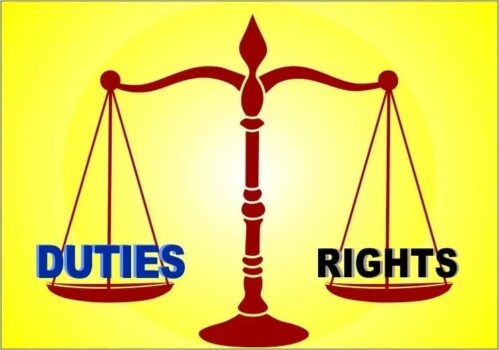
The rights and responsibilities of Nigerian citizens form the cornerstone of a functioning society. In Nigeria, as in many countries, citizens are endowed with certain rights and obligations essential for fostering a harmonious and equitable community. Understanding these rights and responsibilities not only empowers individuals but also contributes to a more conscientious and law-abiding society.
Rights and Responsibilities of Nigerian Citizens
Rights of Nigerian Citizens:
- Right to Life and Dignity: Every Nigerian citizen has the fundamental right to life and human dignity. This includes the right to be free from torture, inhumane treatment, and arbitrary arrest.
- Right to Freedom of Expression: Citizens have the right to freely express their opinions, beliefs, and thoughts without fear of censorship or persecution, as enshrined in the Nigerian Constitution.
- Right to Education: Nigerian citizens have the right to access education, and the government is obligated to provide free, compulsory primary education and promote adult literacy.
- Right to Health: Citizens are entitled to adequate healthcare facilities and services. The government is tasked with ensuring accessible and affordable healthcare for all Nigerians.
- Right to Equality and Non-Discrimination: Every Nigerian has the right to be treated equally regardless of gender, ethnicity, religion, or social status. Discrimination of any form is prohibited by law.
- Right to Property Ownership: Citizens have the right to own property and enjoy the benefits accrued from their possessions within the bounds of the law.
Legal Framework and Enforcement of Rights
The legal framework that safeguards the rights and responsibilities of Nigerian citizens is primarily outlined in the Constitution of the Federal Republic of Nigeria. However, effective enforcement of these rights often faces challenges due to various factors, including bureaucratic inefficiencies, corruption, and inadequate access to justice. Enhancing the implementation of these rights requires concerted efforts from the government, judiciary, civil society, and law enforcement agencies to ensure their practical realization.

Responsibilities of Nigerian Citizens:
- Respect for the Law: It is the responsibility of citizens to abide by the laws of the land. Respecting and upholding the legal framework contributes to a stable and orderly society.
- Active Participation in Governance: Citizens have a duty to actively participate in the democratic process by voting in elections, engaging in civic activities, and holding government officials accountable.
- Payment of Taxes: Contributing to the country’s development through the payment of taxes is a civic duty. Taxes fund public services and infrastructure essential for societal progress.
- Respect for the Rights of Others: Just as citizens have rights, they must respect the rights of others. Treating fellow citizens with dignity and equality is crucial for a cohesive society.
- Environmental Responsibility: Citizens have a responsibility to protect and preserve the environment. This includes sustainable practices and actions aimed at mitigating environmental degradation.
- Community Participation: Engaging in community activities and volunteering efforts helps in the development and progress of local communities and the nation at large.
Importance of Understanding Rights and Responsibilities
Understanding the rights and responsibilities of Nigerian citizens fosters a culture of accountability, social cohesion, and national development. It empowers individuals to demand their rights while fulfilling their obligations as responsible members of society. It also strengthens the relationship between the government and its citizens, leading to a more participatory and inclusive governance structure.
Challenges in Upholding Rights and Responsibilities:
Access to Justice
Despite constitutional provisions, many Nigerians face obstacles in accessing justice due to financial constraints, lengthy legal proceedings, and the prevalence of informal justice systems. Strengthening the judiciary and legal aid mechanisms is crucial to ensure equal access to justice for all citizens.
Corruption and Human Rights Violations
Corruption remains a significant impediment to the protection of citizens’ rights. Instances of human rights violations, including extrajudicial killings, arbitrary arrests, and abuse of power by law enforcement agencies, highlight the challenges faced in upholding fundamental rights. Tackling corruption and ensuring accountability within institutions are critical to safeguarding citizens’ rights.

Socio-economic Rights
While the Nigerian Constitution guarantees socio-economic rights such as the right to education, healthcare, and adequate standard of living, many citizens still lack access to these basic necessities. Addressing socio-economic disparities, improving public service delivery, and enhancing social welfare programs are essential to fulfill these rights for all citizens.
Role of Civic Education
Civic education plays a pivotal role in promoting awareness and understanding of citizens’ rights and responsibilities. Integrating civic education into school curricula, conducting public awareness campaigns, and empowering grassroots organizations to educate citizens about their rights are vital strategies to promote civic consciousness and active participation in governance.
Strengthening Citizen Engagement
Empowering citizens to actively engage in advocacy, community development, and policy-making processes is crucial for fostering a culture of accountability and democratic governance. Civil society organizations, media, and community-based initiatives play instrumental roles in amplifying citizens’ voices and advocating for the protection of their rights.
Conclusion: Towards a More Inclusive Society
In conclusion, recognizing and upholding the rights and responsibilities of Nigerian citizens are fundamental for building a just, inclusive, and progressive society. While challenges persist in realizing these rights, concerted efforts from the government, civil society, and citizens themselves can contribute to overcoming these obstacles. Strengthening legal frameworks, enhancing access to justice, addressing socio-economic disparities, promoting civic education, and fostering citizen engagement are key steps towards ensuring the full realization of citizens’ rights and responsibilities in Nigeria.
Empowering citizens with knowledge about their rights and responsibilities not only strengthens democracy but also fosters a sense of collective responsibility towards building a better Nigeria for all its citizens.
Submitted by ADE for Naijatipsland







![A DIY Heart-shaped Stove Idea For You! [Video]](https://naijatipsland.com/wp-content/uploads/2024/11/464535689_1908915386269260_179091055644742590_n-100x100.jpg)


